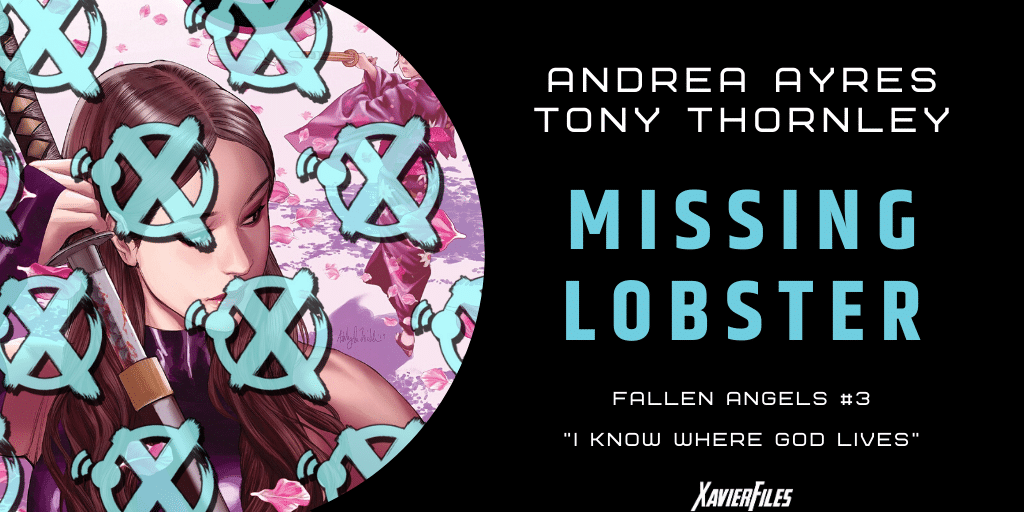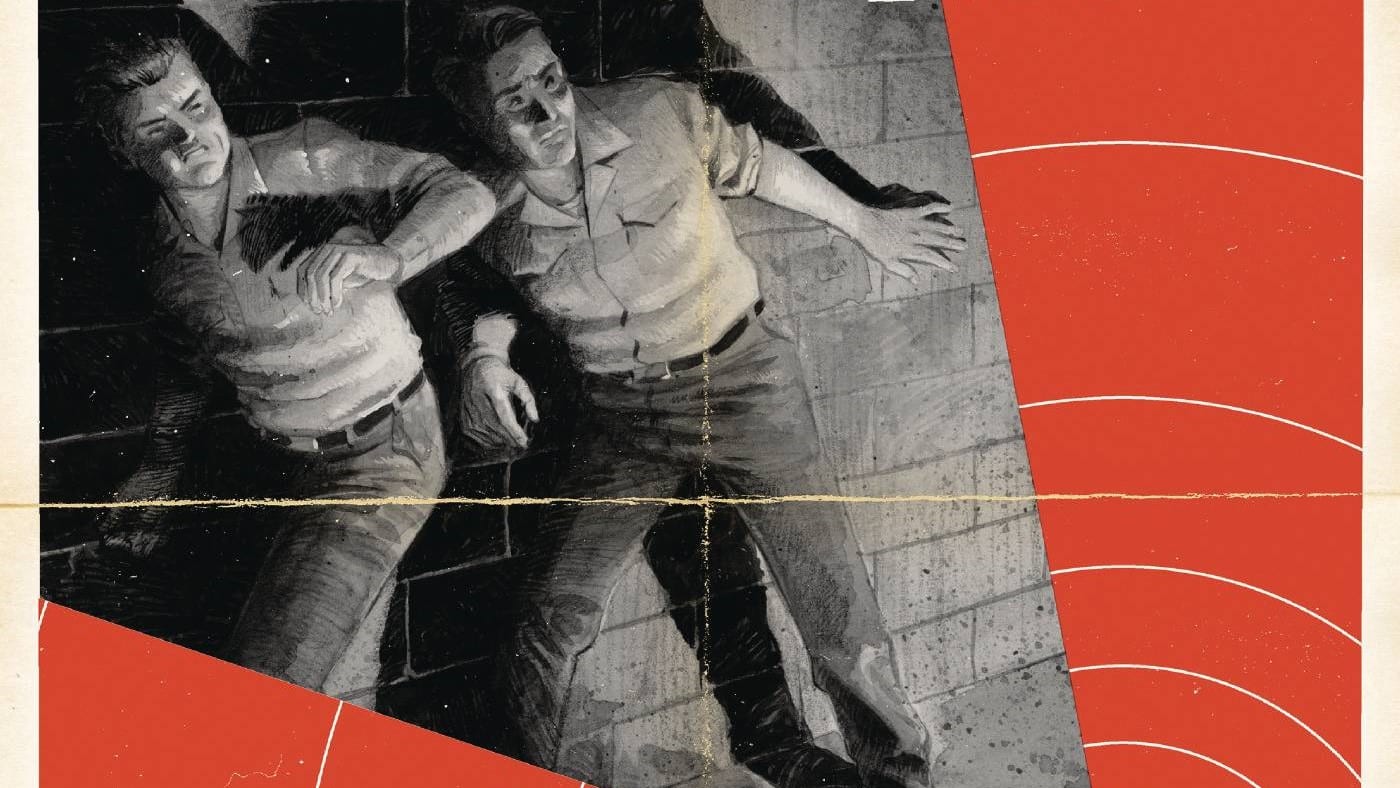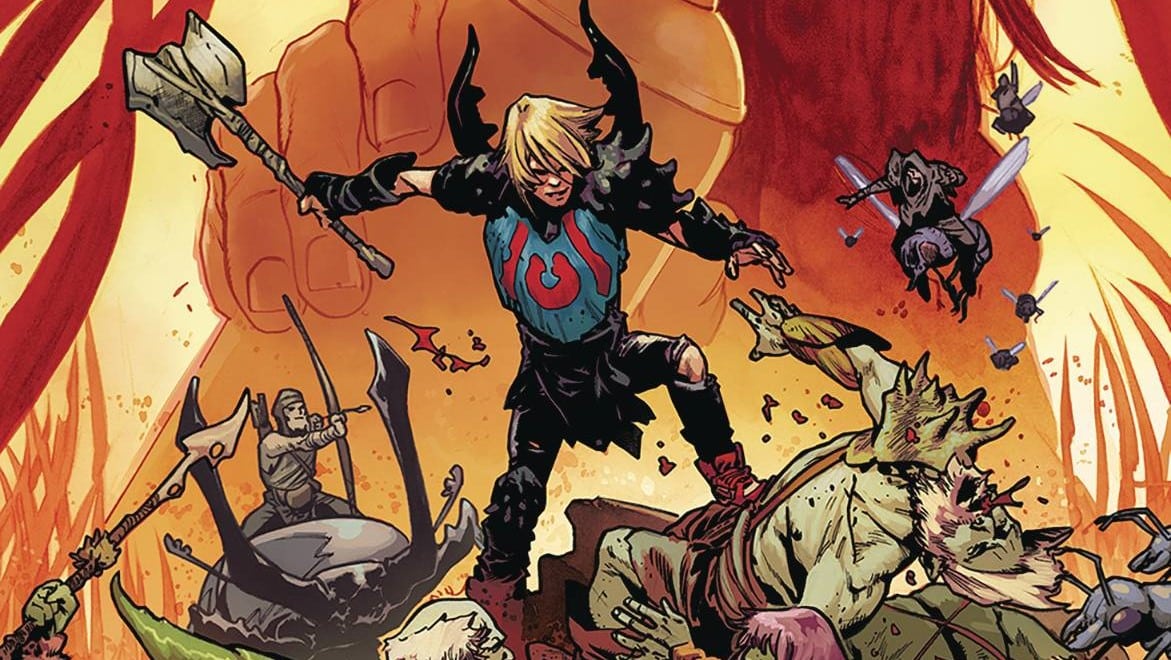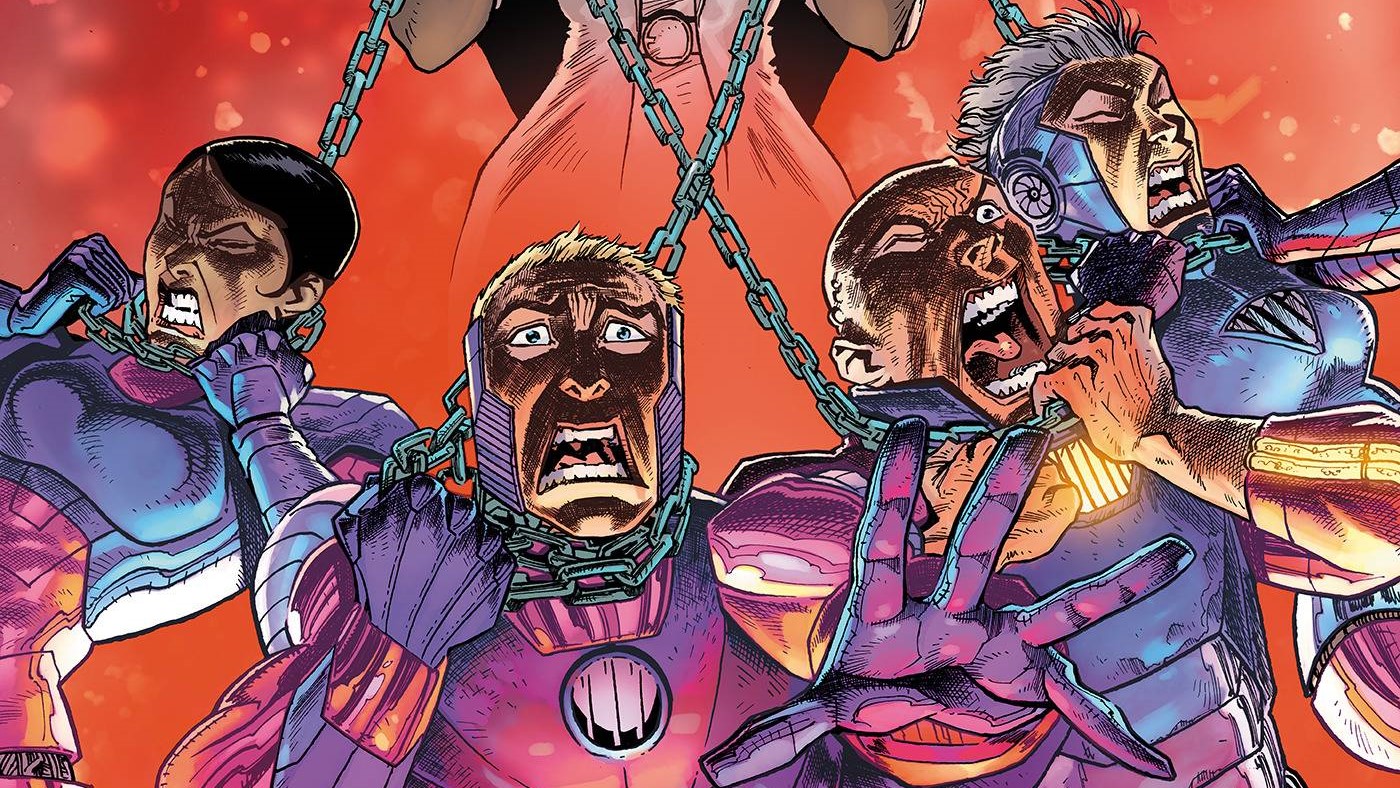Psylocke’s past continues to haunt her as she molds her companions into a fighting force… But can they take on the children of Apoth? Fallen Angels #3 from Bryan Edward Hill, Szymon Kudranski, and Frank D’Armata explores the depths these Fallen Angels will go to find Apoth.
Tony Thornley: Oh my goodness Andrea, that was quite an issue. I really dug one thing about the issue and that was the antagonists. When we were introduced to Apoth I was expecting it to be something familiar- an evolution of the Sentinels, or something Phalanxy or something like that. I did not expect this much of a horror villain.
Andrea Ayres: It really was a humdinger Tony. Apoth feels kinda Lovecraftian to me, which I know is an easy call out, but it was one of the first thoughts that came into my head.
TT: That’s interesting, because the Apoth drones reminded me of War of the Worlds. But now that you say that, I definitely see the Lovecraft in them, especially that last page.
AA: Now that you say that, I can’t unsee it. I found myself wishing we could spend more time with the drones or perhaps, that the art style served them better?
Day of the Tripods

AA: Ok. Before we go any further, I need to get something off my chest right from the start here. The opening panels where Apoth is talking…
“I know where God lives. God lives in the moment a gunshot ends a life. God lives in the moment a gunshot ends a life. God lives in the first breath of a child being born. Both moments equal. Neither good nor evil. God cannot consider morality. God is purpose itself. I am Apoth. I am God. God made my man. To make men as God.”
This phrasing is so clunky. It feels like it’s trying so hard to get the reader to believe this is intellectual and edgy. By drawing moral equivalency between a violent death and birth the reader is meant to say ‘wow, this is a bad thing this Apoth!’ But what really blisters my biscuit is how forced the writing feels and how it ends up being amplified by the art which accompanies it.
TT: You’re right. It’s extremely purple prose, and that lessens the impact quite a bit. Outside of that, Apoth also references that Psylocke/Kwannon is its parent. What do think of that? I imagine it’s figurative, but could it be literal?
AA: You know, I’m not really sure either. I think it’s important to note that Apoth specifically says Psylocke is its mother and created it. Apoth also offers the thinly veiled threat that she will soon serve ‘your child.’ There’s a lot of baggage when it comes to children, motherhood and superhero comics. [Ed. note: Jeffrey A. Brown (2011) Supermoms? Maternity and the monstrous-feminine in superhero comics, Journal of Graphic Novels and Comics] The threat here is of course that Psylocke will once again lose control over her agency, life and choices.
It’s a uniquely gendered threat and one that strikes me as kind of odd considering in the previous panels Apoth has already noted it was created by man? There’s something about that specific line which ends up undermining this panel for me. There’s also this idea of Apoth being a kind of child of Psylocke is perhaps laying the framework for us to suspect that there is some part of her that is corrupted and/or corruptible because there is an expectation societally that the mother is responsible for the sins of the child.
TT It also implies for me that there’s more to the “secret child” plot that we got in the first issue that last issue skipped. I mean, the first issue pretty heavily implied that the girl who caused the train accident was the child Kwannon was forced to give up. Is this going to give us some sort of twist that the child has somehow evolved into Apoth? Again though, this is a heavily gendered plot that sits with you the same it sits with me- I’m not a fan to put it lightly.
AA: Yep, that seems very likely indeed.
Ninja-Splaining

TT: So after we get a moment of Cable going after the tripods and failing horribly, we see Psylocke and X-23 team up to fight them. And my goodness does this scene not sit right with me.
AA: This scene upset the double h-hockey sticks out of me. Yes, I’m pulling out the bad words now Tony. Earmuffs. Why is it necessary for Psylocke to establish her authority by implying X-23 is somehow incapable of fighting? Couldn’t have this been done in, oh, a thousand other ways? I mean, I literally laughed at the “Never take your attention from the enemy. No matter what.” Which I don’t think is what they were going for.
TT: You’re exactly right. There’s two other things that bother me. First of all, Laura Kinney has been trained as an assassin since she could walk. She’s not Logan, an untrained brawler who gradually learned more graceful fighting styles as he got older. She might not be a martial artist, but I’d be willing to say she’s likely as skilled as someone like Black Widow or Captain America. So why is Psylocke talking down to her like this?
AA: Thank you! It feels so damn patronizing to the point of satire? I’d be remiss to not point out something to go with this that our colleague Nola Pfau said the other day regarding another wonky moment. Why would Psylocke, an extremely capable telepath, rely on X-23 to relay a message to the child? Especially as Psylocke is in the process of using those abilities to scan the child’s mind?
TT: Exactly! Secondly, Laura is at least eighteen years old. In All New Wolverine, she had an apartment, she was Gabby’s guardian, stuff like that. But here in both the art and the way she’s written, she’s definitely slid backwards.
AA: It’s not just Laura. Expressions, body shapes, light sources. There’s so much happening in this issue that rely defy the laws of physics, which would be A-OKAY if it felt intentional but yeeeeowwwwch I don’t believe it is. There are facial expressions and hand gestures in this issue which befuddle me. There are close-ups of eyes and teeth which I guess are stand-ins for a character’s emotional depth. I can feel how tired everyone associated with this comic is with making this comic. I don’t know, what are your thoughts Tony?
TT: The panel where Psylocke looks like a cabbage patch doll haunts me. Joking aside though, you’re exactly right. Camera angles are weird, panel layouts are off and so on. I mean, I actually REALLY liked the scene where Laura tears the tripod to shreds, but even that scene makes weird choices, like hiding her face in shadow for the vast majority of it.
AA: Why is it so dark? Like there are some choices with how bodies are lit and portrayed in motion where I found myself totally taken out of the story and action, only to wonder “where is this directional light coming from?”
TT: Also, did you notice there’s maybe… two pages? Three? Anyways, only a few pages with any sort of background. Otherwise it’s all rainbow speed lines, which is distracting as the story is trying to happen around it.
AA: Oh I noticed! What a mess Tony.
And one last grievance (at least until I move on to my next grievance). The scene where Cable/Nathan is being called to and perhaps corrupted by Apoth? I don’t understand what is happening with Cable’s facial expressions here and where have all the backgrounds for this comic gone? Are they hiding behind the children too?
Why Is It Always Children…No Really, Why?

AA: Won’t someone please think of these poor children? For me the use of children in Fallen Angels to get us to buy into the evilness of Apoth is exhausting. It feels lazy. It’s a lazy emotional ploy and I’m not here for it. They are hiding a bunch of narrative sins behind these kids.
“Apoth knows what you’ve lost. It knows how to hurt you.”
“I was given a vision to stop this. Right now, that’s the only purpose I have. I don’t even have my own name.”
I point out this sequence of dialogue because it actually points to how the entire narrative framework of this series thus far hangs on the back of these children. Now I will tell you why that’s problematic for me. For folks who identify as female, there’s the societal expectation that what must matter to them the most is children. The children are literally giving Psylocke purpose here and that is what I found troubling. Surely Psylocke could also be interested in Apoth and find purpose in confronting Apoth for other reasons. We don’t need the children here, and it feels like the only reason we have them here is to give Psylocke some sort of greater purpose or to imply there is one. Because for a person who identifies as a woman to do something in service of herself and not of the greater good, is seen as selfish and therefore bad.
TT: You’re exactly right, and it’s not just that the series is using children. We are now three for three with this series and dead children. It’s the women in refrigerators trope with children instead of girlfriends. I mean, I have to applaud Hill for not using the tired trope of sexual assault as a motivation for women, but I really don’t think dead, dying and missing children is better, if at all. I respect the hell out of Hill as a writer, but this series is just not clicking. It’s leaning too far into implying that Psylocke’s only value seems to be her gender, and not anything else about her.
AA: I totally agree with everything you said Tony. If Apoth, which we find out in this issue, is proselytizing a kind of masculinized-nihilistic unity, then Psylocke as the ‘mother’ is here to save us all. Her purpose then comes from being a protector of others. Her power, by extension, does not come from within. That’s a gift something masculine superheroes are almost always afforded. The implication is the audience can only see this person as powerful if they are in service to or of another. That’s a gendered trap [Ed. note: Stabile, Carol. (2009). “Sweetheart, This Ain’t Gender Studies”: Sexism and Superheroes].
AA: I guess what is so irksome about this entire Fallen Angels series is that the hope was to finally give Kwannon some kind of agency which didn’t center on Betsy’s (and her whiteness). Sara Century wrote a great post about this, which folks might be interested in. This is where it falls so seemingly flat to me. There is so much rich narrative and possibility to explore but instead what we end up with is a bunch cheap emotional tricks meant to get us to believe that there’s a deeper story here when there isn’t. Instead what we get are tropes and cliches which serve no other purpose than to pacify the reader long enough to make it to the end of the issue. I’m sorry to say, it didn’t work. It was a slog and a disappointment.
TT: I really couldn’t say it better myself. For me, I was excited for this book because of the creators’ past work. Hill has done some amazing comics for the Distinguished Competition, while Kudranski’s work has been great elsewhere. I’m really struggling because I like all the parts, but the whole is not clicking. However, there’s still three issues of the series, so it can turn around. I’m really hopeful that’s exactly what will happen.
X-Traneous Thoughts

- Next Issue’s Krakoan tease- Nymph (probably in the sense of an immature/adolescent insect?) [Ed. note: Unless…]
- Notice how little we mentioned Cable? That’s because he’s basically a guest star.
- Also, Tony’s doubling down on his guess about the prophetic specter- it’s future (or classic/original flavor) Cable
- Buckle your seat belts, the final panel of this issue has me thinking we’re about to go full Eldritch Abomination
- AA’s guessaroo for where this series is going? Apoth represents the loss of individuality, reason and identity. Psylocke will be there connect us all once again to it and in the process connect to or find her own?
- Check out our coverage of X-Force this week too.
Andrea Ayres writes about comics and culture. She loves research, coffee, and lifting weights.
Tony Thornley is a geek dad, blogger, Spider-Man and Superman aficionado, X-Men guru, autism daddy, amateur novelist, and all around awesome guy. He’s also very humble.







